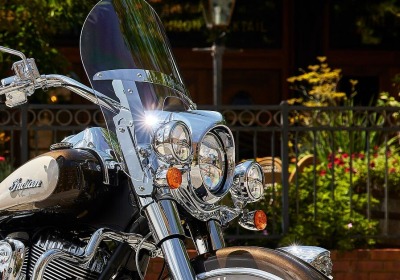How To Protect Motorcycle Chrome
Thu, 04 Apr 2024Keeping the shiny bits shiny
There is sound logic behind popping a bottle of your favorite suds, saddling up next to your bike after a Sunday ride, and going over every shiny bit of chrome with a soft cloth to ensure its gleaming. Protecting your motorcycle’s chrome is about getting ahead of the game with preventative maintenance, ensuring that all the glistening chrome-plated components can continue to thrive for years. In this article, we’ll discuss the nitty-gritty related to chrome, from why it’s used to how owners can keep it in excellent shape. Sound good? Break out those clean rags and get ready to put in some elbow grease.
Promoted Product: Cycle Care Formula M Aluminum/Chrome Polish
Chrome maintenance supplies are a lot cheaper than sending things off for restoration. The best decision motorcycle owners can make is to take care of the chrome they’ve got before things get out of hand. The Cycle Care Formula M Aluminum/Chrome Polish’s pumice-free and grit-free formulation will not scratch highly polished billet and chrome surfaces and its easy on and off application makes polishing aluminum wheels and rims less labor-intensive. Formula M also leaves a protective coat which resists future oxidation for a long-lasting shine, without the use of additional sealers or polishes.
For more products like this one, the Dennis Kirk My Garage Tool is a sure-fire way to find all the products you and your motorcycle need to keep the shiny side, truly looking shiny.
Check Price
What Is Chrome?
Chromium, often referred to as chrome by us MOrons, is a plating process that’s commonly used on motorcycles to protect and decorate components simultaneously. Whether it be metal, plastic, or some other composite material, chrome plating is used in a variety of ways to guard against corrosion and general containments such as oil, grime, or debris.
There are two common forms of chrome plating: Hard and decorative, and the only difference between them is the coating thickness. The name “hard” chrome plating indicates its intent since it is a durable finish used on high-wear components to promote a long lifespan. Hard chroming also has some lubricity considerations, as it’s much slicker than most bare metals alone. Take a look at the stanchions on your motorcycle’s fork – unless it features a costlier Diamond Like Carbon (DLC) or titanium nitride coating, chances are it has good ol’ hard chrome to protect your fork and promote smooth actuation through the suspension stroke.
Meanwhile, decorative chrome plating coats parts that might not see the same abuse. Still, either process performs aesthetic and protective functions to some degree. Regarding decorative chrome’s durability, you could rate it on par with most paint finishes and treat it similarly.
In fact, we should address the question of durability head on, which is what sparked this whole article: Chrome plating is typically a few thousands of an inch thick at a maximum. As you can imagine, there isn’t much material to work with. So, what’s the best policy for protecting your chrome? Making sure it’s kept in tip-top shape in the first place. If the coating becomes chipped, damaged, or peeled, there is no way to repair it beyond stripping it and re-coating the part, but we can use plenty of tricks to keep it shining bright.
How To Clean Chrome
Cleaning and treating chrome are often used interchangeably since owners typically combine the steps. Let’s separate the two for now because giving your machine a once over with a clean microfiber cloth will remove dust and grime, but that doesn’t necessarily mean you’re treating it.
First, let’s talk about cleaning and dispel the misconception that we should avoid using water. A clean microfiber cloth and water is an excellent place to start as owners can wipe away larger bits of grime and dirt with nothing more than elbow grease. This step is crucial because all that grubby buildup collected from the road, despite being potentially made up of dirt, oil, mud, clay, or harsh acidic compounds, will still retain moisture. If this grimy stuff is left on chrome surfaces for long periods, it will promote rusting. Remember how thin chrome plating is? Well, it doesn’t take much to eat through that, and once severe chrome pitting has begun, it’s hard to stop without redoing it altogether.
For more stubborn spots, reaching for a dedicated chrome polishing product from our kind friends at Dennis Kirk isn’t a bad option, and it can help revive the luster of your chrome bits by removing oxidation or built-up debris. If that still isn’t quite doing the trick and you’re hoping to remove something like rubber from a plastic bag or boot, reach for a metal softer than chrome itself – copper wool, for example, to use as an agitator that won’t hurt the chrome plating.
We should never wipe chrome surfaces with our bare hands or a dry rag because you’re more likely to create swirling or inadvertently rub debris into the coating and cause damage. See, water, solvents, and cleaners act as a lubricant when cleaning and will reduce the risk of damaging the shiny surfaces.
Of course, water can damage chrome, but only when it’s allowed to freely dry and leave mineral deposits, which promote rust and oxidation. For example, look at the pipes and chrome bits on your Cousin Jimmy’s clapped-out Harley-Davidson Sportster parked behind the shed – woof – years of neglect have it looking shabby! When you’ve got your bike looking spic-and-span and all the cleaning agents are removed, go ahead, and dry it with a fresh microfiber cloth. At that point, there is no real risk of damaging anything.
How To Treat Chrome
Treating chrome falls under preventative maintenance, but the best practice is doing exactly what we stated above: Ensuring your bike’s chrome is clean, free of contaminants, and rust-free before any pitting starts. Proper and thorough cleaning will always be the best approach.
But what if you want to take preventative maintenance further? Waxes are one of the best options to help protect chrome and other finishes on your machine. Reach for natural wax pastes such as carnauba wax and coat the surfaces in a healthy layer, then buff to a high shine that will not only accentuate your chrome’s reflectiveness but also protect it. Synthetic waxes can also be handy and often provide additional UV protection, which might seem unbelievable when discussing a metal surface like chrome. However, the sun’s harmful rays can do a number on just about anything.
Conclusion
So, what did we learn, folks? Anyone with a penchant for the shiny stuff on their bikes will have some work cut out after a good ride. Keeping your shelves stocked up with clean microfiber cloths on hand and your preferred cleaning or protective chemicals is the most prudent way to keep your chrome shining bright.
We are committed to finding, researching, and recommending the best products. We earn commissions from purchases you make using the retail links in our product reviews. Learn more about how this works.
Become a Motorcycle.com insider. Get the latest motorcycle news first by subscribing to our newsletter here.
More by Edward Narraca
Yeah, thankfully next to no chrome on the 6 bikes I have now.
Interesting information that I didn't know. I have used Mothers brand chrome cleaner on my Buick, and now I will do the same on my 1970 Honda CT90 that I purchased last fall.
New Rider's Hub
Get StartedFind your Motorcycle
Top Brands
Popular Articles
The Honda Hornet CB1000 Is Finally Ready for Production
More Details On 2025 Kawasaki Ninja 1100SX Leak
Can You Ride a Motorcycle in the Rain?
Honda Rebel 1100 Getting Updates and a New Variant for 2025
2025 Ducati Multistrada V4, V4 S and V4 Pikes Peak – First Look
You may also be interested in
Can You Ride a Motorcycle in the Rain?
Can You Add Apple CarPlay To Your Motorcycle?
How to Clean a Motorcycle Windshield
Rally for Rangers Donates Motorcycles to Park Rangers to Stop Poaching of Endangered Species, Protect World Heritage Sites
Racer Gloves USA Under New Ownership
2024 GS Trophy Day 2 – A Taste Test of Sand
2024 KTM 990 Duke Review – Track Test
2025 Ducati Panigale V4S Review – First Ride
Bagger Racing: Do You Dig It? – Question of the Day
Triumph Unveils Bonneville T120 Elvis Presley Limited Edition
Marc Marquez To Join Factory Ducati MotoGP Squad
Interview with Norton CEO Robert Hentschel
2024 KTM 990 Duke Review – Track Test Gallery
2025 Triumphs Go Bold with New Colors
Klim Releases Episode 1 of its Ride To The End Series
A New Ducati Panigale V4 Is Coming for 2025, And We’ve Got Specs
Backcountry Discovery Routes Releases New BDR-X Film Trailer
2025 Ducati Panigale V4 and V4 S – First Look
By Edward Narraca
See also: Where In The World: A Week In Spain Testing Hypermotards and Dukes, Small Adventure Bike, Big Adventure Dreams, Seat Time: Falling on Your Face.



